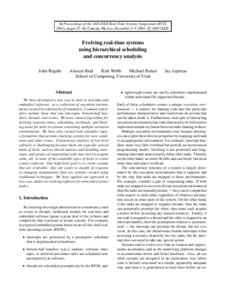Evolving real-time systems using hierarchical scheduling and concurrency analysis
John Regehr, Alastair Reid, Kirk Webb, Michael A. Parker, Jay Lepreau
University of Utah
[pdf]
[doi]
Proceedings of the 24th IEEE Real-Time Systems Symposium (RTSS 2003)
Cancun, Mexico
December 2003
Abstract
We have developed a new way to look at real-time and embedded
software: as a collection of execution environments created by
a hierarchy of schedulers. Common schedulers include those that run
interrupts, bottom-half handlers, threads, and events. We have
created algorithms for deriving response times, scheduling overheads,
and blocking terms for tasks in systems containing multiple execution
environments. We have also created task scheduler logic, a formalism
that permits checking systems for race conditions and other errors.
Concurrency analysis of low-level software is challenging because
there are typically several kinds of locks, such as thread mutexes
and disabling interrupts, and groups of cooperating tasks may need to
acquire some, all, or none of the available types of locks to create
correct software. Our high level goal is to create systems that are
evolvable: they are easier to modify in response to changing
requirements than are systems created using traditional techniques.
We have applied our approach to two case studies in evolving software
for networked sensor nodes.

BibTeX
@inproceedings{DBLP:conf/rtss/RegehrRWPL03
, abstract = {
We have developed a new way to look at real-time and embedded
software: as a collection of execution environments created by
a hierarchy of schedulers. Common schedulers include those that run
interrupts, bottom-half handlers, threads, and events. We have
created algorithms for deriving response times, scheduling overheads,
and blocking terms for tasks in systems containing multiple execution
environments. We have also created task scheduler logic, a formalism
that permits checking systems for race conditions and other errors.
Concurrency analysis of low-level software is challenging because
there are typically several kinds of locks, such as thread mutexes
and disabling interrupts, and groups of cooperating tasks may need to
acquire some, all, or none of the available types of locks to create
correct software. Our high level goal is to create systems that are
evolvable: they are easier to modify in response to changing
requirements than are systems created using traditional techniques.
We have applied our approach to two case studies in evolving software
for networked sensor nodes.
}
, affiliation = {University of Utah}
, ar_file = {RTSS_03}
, ar_shortname = {RTSS 03}
, author = {John Regehr and
Alastair Reid and
Kirk Webb and
Michael A. Parker and
Jay Lepreau}
, booktitle = {Proceedings of the 24th IEEE Real-Time Systems Symposium (RTSS 2003)}
, day = {3-5}
, doi = {10.1109/REAL.2003.1253251}
, file = {rtss03-preprint.pdf}
, location = {Cancun, Mexico}
, month = {December}
, pages = {25--36}
, png = {rtss03-preprint.png}
, publisher = {IEEE Computer Society}
, title = {{E}volving real-time systems using hierarchical scheduling and concurrency
analysis}
, year = {2003}
}
